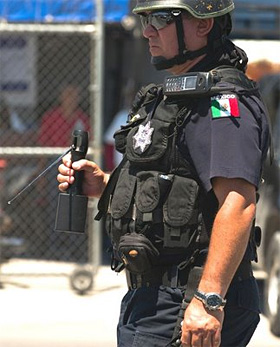
|  |  |  Editorials | Issues Editorials | Issues  
Mexico Is Warned on Drug Detector
 Marc Lacey - New York Times Marc Lacey - New York Times
go to original
March 16, 2010


| | User Dragunov on the Militaryphotos.net forum posted this photo of Mexican police using GT-200 detector molecular for finding drugs and weapons. |  |
Mexico City — The British government has notified Mexico that a handheld device widely used by the Mexican military and police to search for drugs and explosives may be ineffective, British officials said.

Mexico’s National Defense Secretariat has spent more than $10 million to purchase hundreds of the detectors, similar to the “magic wands” in use in Iraq and Afghanistan, for its antidrug fight. Although critics have called them nothing more than divining rods, Mexican defense officials praise the devices as a critical part of their efforts to combat drug traffickers. At the military’s National Drug Museum, one of the devices is on display, with a plaque that describes its success in finding hidden caches of drugs.

Mexican military officials say the black plastic wands, known as the GT 200 and manufactured by the British company Global Technical Ltd., are widely used nationwide at checkpoints to search for contraband inside vehicles as well as to canvass neighborhoods in drug hotspots for drug and weapons stash houses.

As of April 20, 2009, the army had purchased 521 of the GT 200 detectors for just over $20,000 apiece, for a total cost of more than $10 million, according to Mexican government documents. Police agencies across Mexico have made additional purchases, records show.

“We’ve had success with it,” Capt. Jesús Héctor Larios Salazar, an officer with the Mexican Army’s antidrug unit in Culiacán, said recently. “It works with molecules. It functions with the energy of the body.”

But the British government, which is considering legislation to stop exports of the device, notified Mexico and other countries around the world last month that it may not work. That followed reports in The New York Times and on BBC that a similar product used in Iraq and Afghanistan, the ADE 651 manufactured by ATSC Ltd., another British company, was considered ineffective.

“Exports to Mexico have already taken place, and the most urgent task was to warn the Mexican government and military, which we have done,” Katy Reid, a British diplomat in Mexico, said in a statement on Friday. “It is now up to the Mexican authorities to take whatever steps they think appropriate.”

The Drug Enforcement Administration in Washington said it did not use the handheld detectors. And the National Explosive Engineering Sciences Security Center at Sandia National Laboratories in Albuquerque, which does testing for the Defense Department, has not found such devices to be effective.

Mexican defense officials did not immediately respond to requests for comment. E-mail messages and calls to Global Technical and to Segtec, the Mexican-based importer of the GT 200, were not returned.

Controversy over the GT 200 has played out in recent months in Thailand, where the army has said it will continue to use them even though testing by government scientists found them far less effective than specially trained dogs. “I respect the scientific tests, but at this stage there is no banning order by the government, so the army will continue to use it,” Gen. Anupong Paochinda, the Thai Army chief, told reporters.

Human Rights Watch issued a statement in February calling on the Thai government to stop arresting people based on evidence gathered using the GT 200, which it said “performs worse than a roll of the dice.”

Informed that Mexico was using the same unit, the human rights group said Friday: “It’s troubling that Mexico is using this ‘magic wand’ technology given the serious doubts that exist about its reliability. And if people are actually being arrested and charged solely on the basis of its readings, that would be outrageous.”

Promotional materials on the Internet describe the GT 200 as a high-tech unit that enables law enforcement agencies to search large areas quickly. Using special cards provided by the manufacturer, the detector can supposedly detect all types of narcotics and explosives by homing in on their molecules from afar.

The device is so sensitive, the manufacturer says, that it can detect not just stockpiles of illegal drugs but people who have used cocaine or heroin as far back as two weeks before.

After the critical reviews in Thailand, Global Technical released a statement on its Web site defending the detector. “We can say that previous tests carried out by independent bodies, and the experience of the large number of users of this product all over the world, confirms that the GT 200 is effective and because of this, we would ask that you treat with caution any reports to the contrary,” the company said.

In Culiacán, a city in Sinaloa State where Mexican drug traffickers have a strong presence, the military showed off the GT 200 in December. Canvassing a residential neighborhood, soldiers walked up and down the street with a GT 200 waiting for the antenna to point toward a suspicious residence. There were no discoveries.

But the soldier trained to operate the detector walked by one of the army’s armored vehicles and the antenna swung quickly toward the high-caliber machine gun sticking out the top. He took several steps back and walked by again. The antenna pointed again toward the gun.

“See?” he said.

But in November, at a checkpoint on the highway leading from Mexico City to Monterrey, the same device pointed at a Volkswagen containing a man, a woman and a child. Soldiers surrounded the vehicle and a search was conducted for illegal drugs. But all they found was a bottle of Tylenol — evidence, the soldier operating the device said, of how sensitive the GT 200 was. |

 |
|  |



